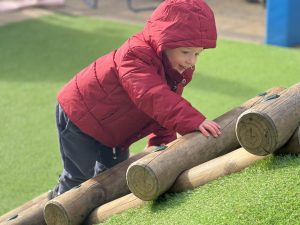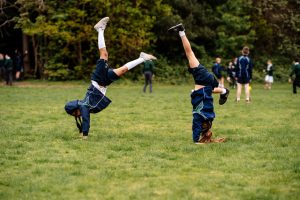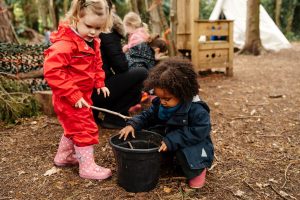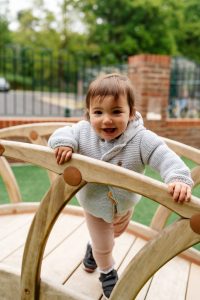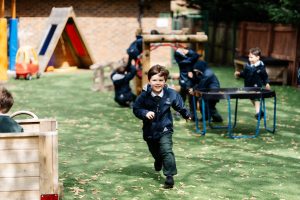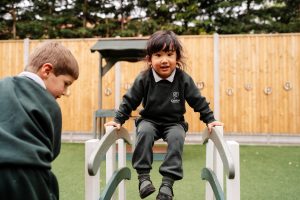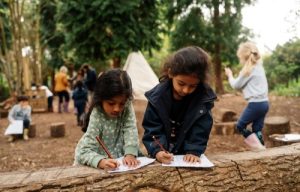Whether it’s in the playground, out on the field, or in our Forest School: outdoor play and learning are vital to a child’s development, especially during their early formative years. Nursery manager Julie Swords explains why outdoor learning is so important to pre-school children as well as their older peers.
The outdoor environment plays a huge part in extending children’s learning and thinking. Government guidelines suggest young children should have three hours of physical exercise every day. All children in Little School are taken out for fresh air and a run-around every day, morning and afternoon. If weather is inclement, we have two huge halls where we provide balls, tunnels, parachutes, and soft play. The land and space available at Greenfield are well-utilised by the very youngest children as much and as often as possible.
Very young children have a very special way of relating to the outdoor world. It is of enormous interest to them … They have an inborn affinity, curiosity and fascination with the natural world: sky, wind, rain and shadows; plants, trees and leaves; sticks, pebbles and rocks; water, puddles and mud; dogs, birds and beetles and people. Children use their whole body and whole self to engage with, explore, dismantle and think about the real world – and this is very apparent when young children are in the real, outdoor world.”
(Jan White, NDNA 2009)
Having the opportunity for children to move around in a large open space is vital for children to develop their gross motor skills (large muscle groups) which develop in a head-to-toe pattern. Think about how a newborn baby first starts to learn to hold their head up independently then over the next few months begins to control their whole body to reach for objects, roll, sit and crawl. As children’s stability and coordination develop, they gain the ability to walk and maintain greater control over their balance and coordination.
Swinging, spinning, rocking, sliding or hanging upside down all stimulate vestibular development. The relationship between the vestibular system and the neck and eye muscles is important as it supports future learning in tasks such as reading and copying from a board or screen.
Babies begin to pick up the proprioceptive sense as they kick their legs and wave their arms as the muscles and joints sends a constant flow to the brain. Proprioception tells us where bodies are in space and where they start and finish, without us having to look at them.
There are strong links between vestibular development and emotional health and wellbeing. Proprioception has equally strong links with emotional wellbeing.
The EYFS 2021 requires that we support children’s development thus: “Children show good control and coordination in large and small movements. They move confidently in a range of ways, safely negotiating space.”
Both the Fledglings and Early Years gardens provide opportunities for children to take measured risks. Risky play can require children to challenge themselves on many levels, which include:
Physically (climbing a little higher, running a little faster, jumping a little further)
Emotionally (feeling out of control or overcoming fear)
Mentally (learning to get out of trouble, learning own boundaries and that of the environment)
Risk allows children to push themselves to the limits of their capabilities and allows them space to progress. Risky play allows children to feel in control of their actions, learning and play, take risks and learn boundaries in a safe, secure environment where they can be supported directly or indirectly by childcare professionals.
Children need to be aware of risks too and how to assess and manage risks in life. It is very important to discuss the benefits of learning to manage risk with children as well as the potential dangers.
We are fortunate to have an amazing forest school which provides opportunities for children to experience a specialised outdoor education approach where children learn personal, social and technical skills in outdoor environments such as woodlands and forests. The process offers all children regular opportunities to achieve and develop confidence and self-esteem through hands-on learning experiences in the natural environment. Little School children visit forest school at least once per week, more often when we are able. Even our babies enjoy trips to forest school, observing the tree canopy when the wind blows, sunlight and shadows on the ground, the changing seasons with bluebells in spring, acorns, pine cones and colourful leaves falling in autumn. The older children enjoy exploring the grounds and the huge tipi and mud kitchens, opportunities to collect natural resources and hunt for bugs …
The outdoors can offer children:
Access to space with opportunities to be their natural, exuberant, physical and noisy selves
Fresh air and direct experience of how the elements of the weather feel
Contact with natural and living things to maintain their inborn affinity, curiosity and fascination with all things belonging to the natural world
Freedom to be inquisitive, exploratory, adventurous, innovative and messy
Endless opportunities for discovery play and talk so that new experiences can be processed and understand and used
An environment that feeds information into all the senses at the same time
Involvement with the whole body giving deeply felt meanings and all-round physical health
Emotional and mental wellbeing, where self-image and esteem grow
Social interactions that build relationships, communication, social skills, and the enjoyment of being with others
Outdoor play, all year round, is vitally important for both adults and children’s overall wellbeing, including physical fitness and mental health. Daylight, fresh air and the sensory exploration of the natural environment helps children grow into strong, capable adults, and helps adults stay young at heart!


